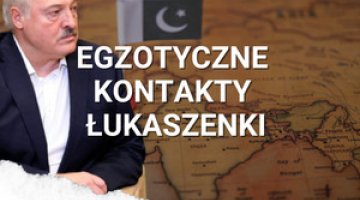Belarus: demobilisation of the protest movement?
The weekly demonstrations of Alyaksandr Lukashenka’s opponents were held on 1 November. This time the slogan "March against Terror" was used. This slogan is associated primarily with the memory of the victims of Stalinism who were executed and buried in 1937–1940 in mass graves in Kurapaty on the outskirts of Minsk. This was the destination of the 30,000-50,000-strong march. This number denotes a continuation of the downward trend that has been observed for weeks, interrupted by a one-off mobilisation on 25 October provoked by Sviatlana Tsikhanouskaya’s ultimatum (more than 100,000 people demonstrated then). The strength of the protests in the provinces has also decreased, and this time no major demonstrations were seen there. There was also an unsuccessful attempt on 31 October to hold a support action in Hrodna for a group of around 150 workers who are on strike at the Grodno Azot nitrogen plant.
The participants in the Sunday march presented great determination when confronting the law enforcement forces, resisting their attempts to detain them. Despite numerous instances of incitement (e.g. throwing heavy objects at the policemen most likely performed by plainclothes officers) and attacks by uniformed police forces, the demonstrators remained calm and several thousand of them made it to the necropolis in Kurapaty. Law enforcement forces attempted to break up the columns of protesters, and smaller groups were also attacked. As in previous weeks, stun grenades, occasionally rubber bullets (shot mainly into the air) and tear gas were used. Over 300 people were detained, most of them in Minsk.
Last week, the government adopted tougher repressions against the most rebellious circles, in particular the actively protesting students, about 100 of whom have already been expelled from several universities (mainly those based in Minsk). The few workers trying to strike openly have been intimidated or dismissed and replaced by specialists from other entities with a similar production profile (e.g. at the Grodno Azot plant). Government representatives have repeatedly accused their opponents of terrorist activity, as evidenced by the alleged numerous acts of sabotage on the railways that disrupt train traffic.
On 29 October, Lukashenka dismissed the Minister of Internal Affairs, Yuri Karayev, replacing him with Ivan Kubrakov, who had served as the head of Minsk police. He also appointed the following presidential assistants (privileged representatives of the head of state in the regions): Secretary of the Security Council Valery Vakulchik in Brest Oblast, Karayev in Hrodna Oblast and Deputy Minister of Internal Affairs, Alexander Barsukov in Minsk. The representatives appointed in the frontier oblasts of Brest and Hrodna were granted the right to use the troops stationed there, in particular the 6th Independent Mechanised Brigade in Hrodna and the 38th Air Assault Brigade in Brest. Lukashenka claims that this staff reshuffle was necessary, given the need to restore order in the streets and in workplaces and to increase control over society. In addition, he supported the – allegedly grassroots – initiative of forming so-called “people's teams”, made up of former military officers and reservists from other law enforcement agencies, to assist law enforcement in combating destabilisation attempts.
Also on 29 October, the government introduced a temporary entry ban (with a few exceptions) for all foreigners on the border with Latvia, Lithuania, Poland, Ukraine and Russia (in the case of the latter this is only in formal terms since there is no full border control here). This can be explained by Lukashenka's repeated suggestions that the border should be sealed with the EU and NATO countries due to the alleged growing threat from the West, which reportedly “wants to destabilise” the situation in Belarus. Only the international airport in Minsk is not blocked. Officially, this decision was justified by the growing number of COVID-19 infections. The unofficial ban has also been used with regard to Belarusian students returning to the country, some of whom have not been allowed to enter the country in recent days, which is against local law.
Commentary
- The demobilisation of some of the regime's opponents, tired of the lengthy post-election crisis, is probably an effect of the failure of the general strike announced on 26 October (none of the plants managed to completely block production), which was expected to force Lukashenka to resign. The number of protesters could also be reduced due to the selective repression measures taken against representatives of rebellious circles, and numerous threats from the government, including accusing those demonstrating of terrorism. Therefore, it cannot be ruled out that the downward trend in participation in the demonstrations will continue in the coming weeks.
- Despite the visible measures taken by the police to disperse the protesters in Minsk, officers refrained from intervening under pressure from the crowd in several places. They also avoided the brutal pacification of the demonstrators for fear of escalating the anger of citizens, which could lead to a renewed increase in the number of demonstrations. The course of Sunday's protest action shows the fatigue experienced by both sides of a political crisis that has now been ongoing for almost three months. On the one hand, the opposition is unable to permanently expand its activities beyond the Sunday demonstration in Minsk. On the other, the regime is still unable to regain full control of the rebellious society (hence the decision to create the so-called people's teams, i.e. de facto legal militias).
- The fact that Karayev has been delegated to Hrodna proves that Lukashenka believes that Hrodna Oblast faces a high risk of destabilisation due to the protests (the most active attempts to go on strike have so far taken place at the Grodno Azot plant). The nomination of Kubrakov, on whom the EU and the US imposed visa sanctions, and the appointment of senior officers with extra powers as plenipotentiaries in the three most rebellious regions may herald an increase in repression against opponents, especially in the event of a further decline in the number of protests, once public resistance weakens. Furthermore, the tasks of the newly appointed officials is likely to include strict control over the civil administration. Lukashenka indirectly hinted at this in a statement in which he warned officials against the consequences of disloyalty. In an extreme case, a state of emergency could be declared. The recurring narrative of maintaining the increased readiness of military units on the western frontier and the allegedly growing external threat may signify the risk of provocation against Poland and Lithuania.





